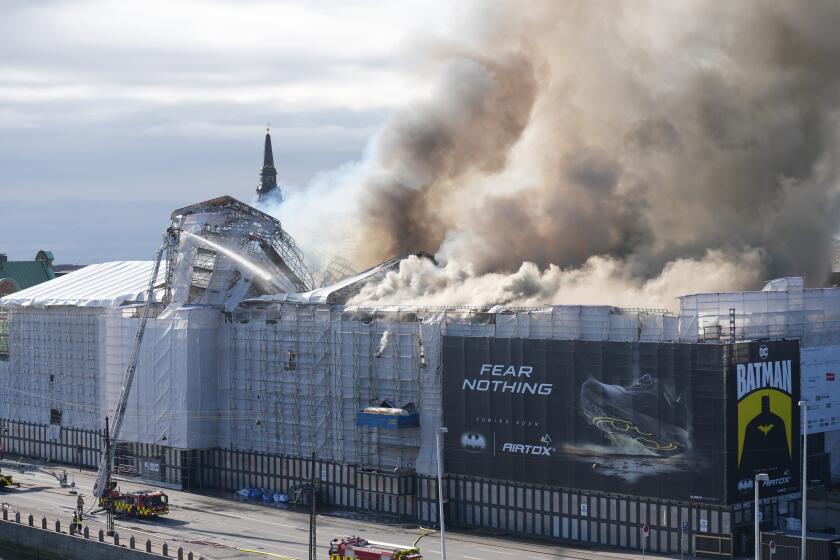Justices to Hear Mexican Truck Case
The Supreme Court agreed Monday to decide whether tens of thousands of Mexican trucks can cross the border and deliver goods in the United States, despite the potential for increased air pollution.
The justices will referee a clash between those who favor free trade in North America and those who say that regardless of free-trade concerns, America’s antipollution standards should not be set aside.
For the last 20 years, Mexican trucks have been limited to operating in a 20-mile border zone in the United States, but President Bush said two years ago he intended to lift that limit.
The North American Free Trade Agreement, or NAFTA, seeks to create a free-trade zone between Canada, Mexico and the United States, and an international arbitration panel ruled that the United States was violating the treaty by continuing to bar Mexican trucks from moving much beyond the border.
“We ought to enforce all of NAFTA,” Bush said. “I believe strongly we can have safety on our highways without discriminating against our neighbors to the south.”
Consumer advocates, environmentalists, the Teamsters Union and California Atty. Gen. Bill Lockyer joined in a lawsuit against the Department of Transportation to block Bush’s order from taking effect. They said at least 30,000 Mexican trucks would enter the U.S. annually. About two-thirds of them are older trucks that emit more pollution, they said.
The Mexican trucks would dramatically increase air pollution in areas such as Los Angeles and Houston, which already have badly polluted air, the lawsuit alleged. A study conducted by the plaintiffs said the Mexican trucks would emit twice as much particulate matter and nitrogen oxide as U.S. trucks. These emissions have been linked to asthma, bronchitis, lung cancer and urban haze, the suit said.
In January, the U.S. 9th Circuit Court of Appeals agreed with the challengers and ruled that federal regulators had failed to complete the environmental analysis that was required by the Clean Air Act.
“We emphasize that we draw no conclusions about the President of the United States nor the validity of NAFTA, neither of which is before us,” said Judge Kim Wardlaw for the 9th Circuit. “The only question before us is whether a federal agency failed to comply with our nation’s long-established environmental laws.”
She concluded the Department of Transportation “acted arbitrarily and capriciously in failing to prepare” the environmental impact study required by law.
In their appeal, Bush administration lawyers say the decision tramples on the president’s power to deal with other nations.
“The 9th Circuit’s misapplication of [the law] endangers the president’s authority to act quickly and decisively in areas such as foreign affairs and national defense,” U.S. Solicitor Gen. Theodore B. Olson told the court. “Particularly in the area of international diplomacy, the president must be able to speak with one voice.”
He also argued that blocking the free movement of Mexican trucks would prove costly and cumbersome for shippers and consumers. About 4.5 million northbound trucks cross the border each year and enter California, Arizona, New Mexico and Texas, the government said. At the time of the arbitration ruling, Mexican officials estimated the nation had suffered $2 billion in losses and extra costs because of the need to transfer goods from their trucks to U.S. vehicles.
But consumer activists and environmentalists say they expect the Supreme Court will agree with them.
“We believe ... the justices will rule that federal environmental laws require the government to determine the health impact of those trucks before -- not after -- they begin rolling through the American heartland,” said Joan Claybrook, president of Public Citizen, an advocacy group.
The administration has pressed ahead with the environmental impact study while appealing the 9th Circuit ruling.
“The last thing the Bush administration should do is stop this process dead in its tracks,” said Gail Ruderman Feuer, senior attorney with the Natural Resources Defense Council in San Francisco. “Unfortunately, this administration would rather cut corners than protect the health of Americans”
More to Read
Start your day right
Sign up for Essential California for news, features and recommendations from the L.A. Times and beyond in your inbox six days a week.
You may occasionally receive promotional content from the Los Angeles Times.







